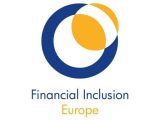Promote financial inclusion in Europe
Definition
“Financial exclusion refers to a process whereby people encounter difficulties accessing and/or using financial services and products in the mainstream market that are appropriate to their needs and enable them to lead a normal social life in the society in which they belong.”
There is a widespread recognition that financial exclusion forms part of a much wider social exclusion, faced by some groups who lack access to quality essential services such as jobs, housing, education, or health care.
Financial products will be considered “appropriate” when their provision, structure and costs do not lead the customer to encounter access and/or use difficulties.
“Mainstream providers” may be considered as non-stigmatizing providers regarding to the national reference. Related to the market structure of each country, a particular type of providers may appear as mainstream in one and as “alternative” in another one.
“Alternative” may refer to organisations paying special attention to marginal segments, often operating as not-for-profit organisations (such as “alternative commercial social-oriented” structures) and acting in compliance with rules and regulations or other providers which exploit the marginal market segments and often act on the borderline of legality (“alternative commercial profit-oriented” entities).
Common perspective: promote human dignity and social inclusion
Financial inclusion is an operative concept to structure policy action in order to promote social inclusion, protect human dignity and guarantee a dignified minimum standard of living.
References: European Charter of Fundamental rights/ EU Pillar of Social Rights/…
Geographic area: worldwide
As research field, Financial Inclusion has no geographic limit.
Nevertheless, the main activities of the project are going to be centered on the EU and its regulations.
Activities to be developed
Increase knowledge on financial inclusion:
Fact based approach, which includes early detection of issues on the field from practitioners to EU wide hard database analysis, qualitative survey, desktop research and any other research based means which increase the understanding of financial exclusion.
From the knowledge collected, the project documents financial inclusion issues, analyses their causes, design solutions, and formulate recommendations for relevant stakeholders.
For an issue to be solved, it must be identified and understood. The analysis should, as much as possible, allow to describe the consequences on individuals, on society, on non-for-profit financial services (third sector) industry, and on public authorities and their budgets (tax payers).
Elaborate knowledge on the knowledge:
Financial exclusion suffers from a lack of appropriate indicators and from common methodology or tools to collect data at the EU level. The project will develop a specific knowledge and will formulate recommendations for relevant stakeholders
Increase awareness on financial inclusion:
Key stakeholders are the target, with a priority on policy makers and competent authorities, both at national and the EU level.
Influence the regulation to reinforce financial inclusion
Experience in the field underlines the relevance to advocate for regulatory initiatives as a major tool for improvement. Advocacy gains in efficiency when it is built on sound knowledge, supported by strategic communication.
Collaboration and partnership (example) :
- with public bodies:
- Knowledge: for research, data collection, survey, and statistics
- Awareness & Regulation: collaboration facilitates the capacity to raise awareness and to stimulate regulatory action
- with academics and research centers
- Knowledge: for research, data collection, survey, and statistics
- with NGOs and civil society:
- Knowledge: for research, data collection, and survey. They fulfill a key role to approach the most vulnerable, to document social reality with qualitative methods, in order to support existing advocacy by NGOs on financial inclusion issues.
- Awareness: collaboration increases the capacity to raise awareness in additional layers in the society, at EU but also at the national level
- Advocacy can benefit from a large coalition of NGOs/ by means of a coordinated action plan to echo targeted messages to identified stakeholders
- with private entities:
- Alternative “companies”/socially oriented, micro-finance, third sector
- Foundations – each collaboration will be studied and should respect some “principles” to be elaborated as regards institutional risk such as :
- reputational: independence,
- financial: sustainability, vulnerability
- …
